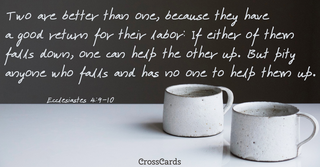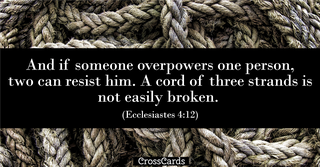
Change Translation
- Recent Translations
- All Translations
Ecclesiastes 4:10
Share
Listen to Ecclesiastes 4:10
Settings
Scripture Text Size
10
If one falleth down, he shall be underset of the tother; woe to him that is alone, for when he falleth, he hath none to raise him up. (If one falleth down, he shall be helped up by the other; woe to him who is alone, for when he falleth, he hath no one to raise him up again.)
Ecclesiastes 4:10 Meaning and Commentary
Ecclesiastes 4:10
another to help him up;
no companion to raise him up when fallen; no Christian friend to visit and comfort him when sick, to relieve him under his necessities, when poor and afflicted, or to recover him from errors in judgment, or immoralities in practice; and especially if he has not Christ with him to raise him up, keep, and uphold him.
For if they fall, the one will lift up his fellow
That is, if anyone of them fall, the other will lift him up, as they are travelling together, in whatsoever manner; if one falls from his horse, or out of his carriage, or into a ditch, the other will endeavour to raise him up again: this, as it is true in a natural, so in a figurative and metaphorical sense, with religious persons especially;
``if one of them falls upon the bed, and lies sick,''as the Targum paraphrases it, his friend and brother in a religions community will visit him, and sympathize with him, and speak a word of comfort to him, and pray with him, which may issue in his restoration. So the Targum,
``the other will cause his friend to rise by his prayer;''or if he fall into outward distress, poverty, and want, his spiritual friend or friends will distribute to his necessity; if he falls into errors, as a good man may, such as are of the same religious society with him will take some pains to convince him of the error of his way, and to convert him from it, and to save a soul from death, and cover a multitude of sins; and if he falls into sin, to which the best of men are liable, such as are spiritual will endeavour to restore him in a spirit of meekness; but woe to him [that is] alone when he falleth! for [he hath] not
another to help him up;
no companion to raise him up when fallen; no Christian friend to visit and comfort him when sick, to relieve him under his necessities, when poor and afflicted, or to recover him from errors in judgment, or immoralities in practice; and especially if he has not Christ with him to raise him up, keep, and uphold him.
Taken from John Gill's Exposition of the Bible
Unlock Deeper Insights: Get Over 20 Commentaries with Plus! Subscribe Now
Ecclesiastes 4:10 In-Context
8
one there is, and he hath not a second; neither a son, nor a brother; and nevertheless he ceaseth not to travail, neither his eyes be (ful)filled with riches; neither he bethinketh (to) him(self), and saith, To whom travail I, and deceive my soul in goods? In this also is vanity, and the worst torment. (one is alone, and he hath not a second, or someone with him; neither a son, nor a brother; and yet he ceaseth not to labour, and his eyes be not fulfilled with his riches; nor he thinketh to himself, and saith, For whom do I labour, and deprive myself of the enjoyment of good things? This is also empty and futile, and the worst torment.)
9
Therefore it is better, that two be together than one; for they have profit of their fellowship. (And so it is better, that two be together, rather than that they be alone; for they shall have profit, or shall benefit, from their fellowship.)
10
If one falleth down, he shall be underset of the tother; woe to him that is alone, for when he falleth, he hath none to raise him up. (If one falleth down, he shall be helped up by the other; woe to him who is alone, for when he falleth, he hath no one to raise him up again.)
11
And if twain sleep together, they shall be nourished together; (but) how shall one be made hot?
12
And if any man hath [the] mastery against one, twain against-stand him; a threefold cord is broken of hard (a threefold cord is much harder to break).
Copyright © 2001 by Terence P. Noble. For personal use only.
